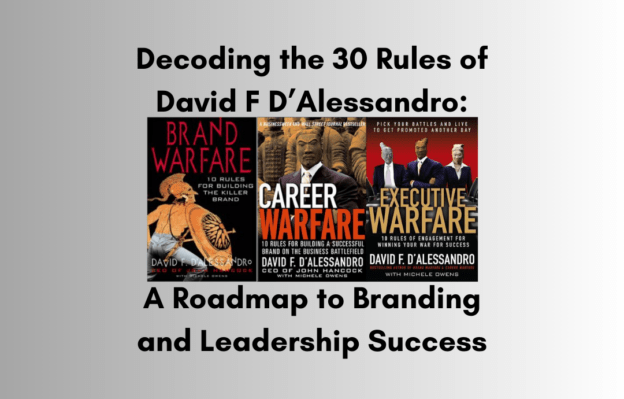Drawing from David F. D’Alessandro’s trilogy, this article distills core principles for branding and leadership. Discover insights that offer a roadmap to strategic growth in both personal and corporate realms.
Introduction
In the dynamic world of branding and corporate leadership, rules and strategies become paramount in navigating the intricacies of success. David F. D’Alessandro, in his trilogy of books – “Brand Warfare,” “Career Warfare,” and “Executive Warfare” – presents a comprehensive set of rules that act as a roadmap for aspiring individuals and brands alike. Delving into these rules, one can uncover patterns, strategies, and shared philosophies that span across personal branding, corporate dynamics, and executive leadership. This article aims to explore and group these rules by affinity, offering readers a synthesized perspective on D’Alessandro’s corporate wisdom.
1. Awareness & Perception
This group emphasizes the significance of brand and personal visibility in the eyes of consumers, colleagues, and superiors. Rules in this category deal with how you or your brand are perceived by others. It underlines the fact that your reputation or the reputation of a brand plays a crucial role in determining its success. It’s not only about having a brand or a personal identity; it’s about how that identity is viewed by the world.
2. Navigating Corporate & Personal Dynamics
These rules focus on understanding and managing the intricate dynamics of corporate culture and personal relationships within a business environment. They touch upon the strategies and tactics one might use to navigate the complexities of business relationships, from dealing with superiors to managing peers and subordinates. The emphasis is on being proactive, understanding corporate politics, and ensuring alignment with company culture.
3. Character & Integrity
This group emphasizes the significance of trustworthiness, consistency, and maintaining a moral compass. It’s about building and maintaining trust with consumers, colleagues, and superiors. Rules here underline the fact that the integrity of a brand or individual is paramount. When challenges arise, these rules guide on how to handle situations in a manner that preserves or restores that trust.
4. Knowledge & Passion
The rules in this category highlight the importance of being well-informed, enthusiastic, and genuinely invested in one’s work or brand. It’s about having a deep understanding of your product, brand, or industry, and conveying that knowledge with passion. These rules suggest that success often comes to those who are not only knowledgeable but also truly passionate about what they do.
Each group represents foundational elements of branding, career growth, and executive success, as described across D’Alessandro’s three books.
Grouped by Affinity
Awareness & Perception
- Everyone has a personal brand, like it or not. (Career Warfare, Rule 1)
- Consumers do not buy brands they do not know. (Brand Warfare, Rule 3)
- Be aware that appearances matter. (Career Warfare, Rule 3)
- It’s all on the record. (Executive Warfare, Rule 3)
- Never let anyone see you sweat. (Executive Warfare, Rule 5)
Navigating Corporate & Personal Dynamics
- Your boss is the most important person in the world. (Executive Warfare, Rule 1)
- Always remember they hate you. (Executive Warfare, Rule 2)
- Be careful with whom you associate. (Career Warfare, Rule 7)
- Understand the company’s culture. (Career Warfare, Rule 8)
- In times of change, everything is up for grabs. (Career Warfare, Rule 9)
- Learn to play offense. (Career Warfare, Rule 4)
- Achievements alone won’t help. (Career Warfare, Rule 5)
- No Brand Is an Island. (Brand Warfare, Rule 4)
- Protect Your Brand at All Costs. (Brand Warfare, Rule 3)
- If Your Brand’s in Trouble, Rebrand. (Brand Warfare, Rule 8)
Character & Integrity
- Decide what you want to stand for. (Career Warfare, Rule 2)
- Never let personal weaknesses go public. (Career Warfare, Rule 6)
- When you’re in a hole, stop digging. (Career Warfare, Rule 10)
- Avoid the dangerous threesome. (Executive Warfare, Rule 7)
- Beware the too-loyal number two. (Executive Warfare, Rule 6)
- Always be graceful under pressure. (Executive Warfare, Rule 8)
Knowledge & Passion
- It’s the product, stupid. (Brand Warfare, Rule 1)
- Brands Are Like Products, They Must Be Updated. (Brand Warfare, Rule 2)
- Know the business better than anyone else. (Executive Warfare, Rule 9)
- Never underestimate the power of enthusiasm. (Executive Warfare, Rule 10)
- Use Ads to Build Brands, Not Vice Versa. (Brand Warfare, Rule 9)
- Be Willing to Cannibalize Your Brand. (Brand Warfare, Rule 10)
- Learn to Play Offense, Not Defense. (Brand Warfare, Rule 5)
- Always Be Skeptical of Brand Research. (Brand Warfare, Rule 6)
- Brands Can’t Stand Still. (Brand Warfare, Rule 7)
- Make sure you have a life (or at least a good story). (Executive Warfare, Rule 4)
Conclusion
Navigating the complex landscapes of branding and leadership necessitates a profound understanding of underlying principles, tactics, and strategies. David F. D’Alessandro’s trilogy provides invaluable insights that, when dissected and grouped by affinity, reveal overarching themes that are pivotal for success in both personal and corporate realms. Whether one is nurturing a fledgling brand, striving to elevate their personal career trajectory, or leading at the executive level, these rules serve as guiding lights. Embracing them ensures a journey marked by clarity, integrity, and a deep-rooted passion for one’s endeavors.
